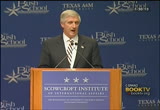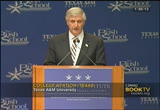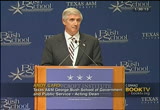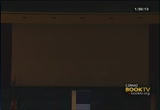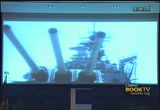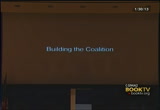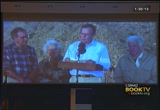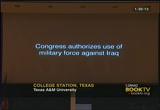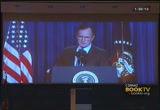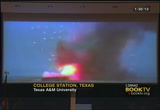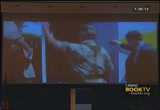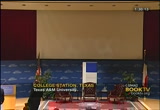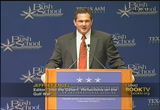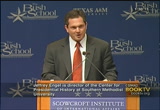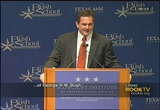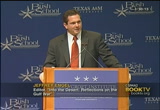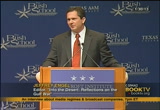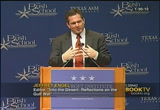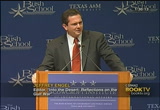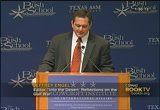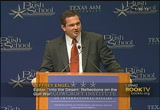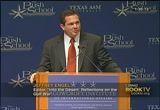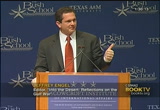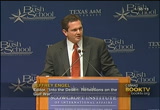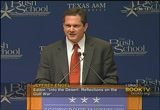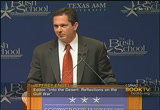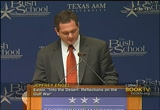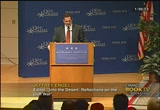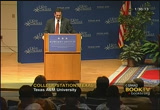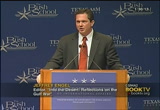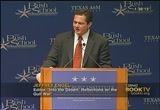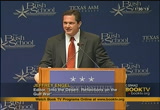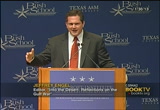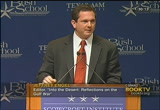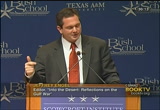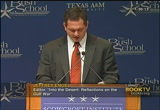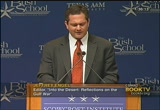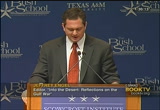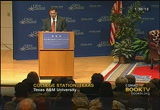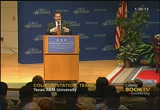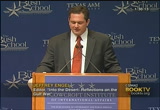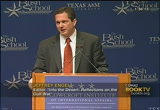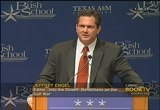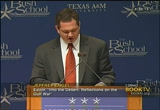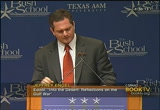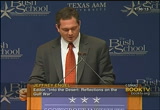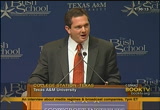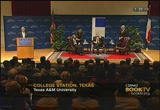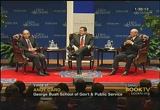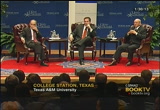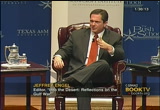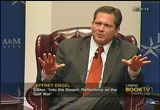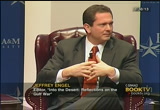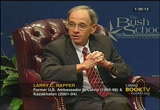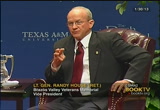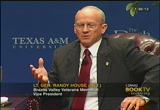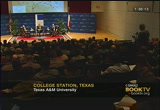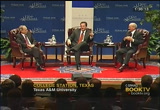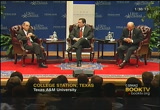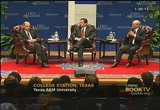tv Book TV CSPAN February 10, 2013 5:00pm-6:00pm EST
5:00 pm
thank you for the support you've given to jeff engel and the bush school and texas a&m had. when jeff was here at texas a&m here is the director for the scowcroft institute and he was at cornell university. he dished i studied it in catherine's college, oxford university and received his phd in american history from the sonatas and. he served as a postdoctoral fellow in international security
5:01 pm
studies at yale university. his books include cold war at 30,000 feet, the anglo-american fight for supremacy. he received a pretty significant award he won a prize from the american historical association process and a work in strategic history. he wrote consequences of the global cold war published by stanford university press in two nay and the china diary of george h.w. bush, making of the global president published by princeton university press in 2008. the whole reform with one of our manufacturers with the strategic studies institute and 20 times and he wrote to follow the berlin while the revolutionary
5:02 pm
legacy of 1989, published by oxford university press in 2009. obviously a mission that the bush school, but it we know he's doing well asset me. i would now like to suggest are going to have a reintroduction to dr. jeff said are you coming up on stage. before he brings his earmarks were going to see a video and this is a pretty significant video because its video in president bush's own words and it chronicles the events following the invasion of kuwait. i would take you now to pay attention to this video and after it's over, we'll have just single, contact to us. thank you very much. [applause] >> in the early-morning hours of
5:03 pm
august at akkad, following negotiations and promises iraq's dictator, saddam hussein not to use force, a powerful iraqi army invaded it stressed and much weaker neighbor, kuwait. within three days, 120,000 iraqi troops with 850 tanks have poured into kuwait and moved south to threaten saudi arabia. >> in my direction, elements of the 82nd airborne division as well as key units are juicy keen of no one friend or fellow and no one should underestimate our determination to confront aggression.
5:04 pm
>> our objectives in the persian gulf are clear. our goal is to find and familiar. iraq must withdraw from kuwait completely, immediately and without conditions. [applause] these goals are not ours alone. they've been endorsed by the united nations security council five times in as many weeks. most countries share our concern for principal and many have a state in the stability of the persian gulf. this is not a saddam hussein would have it, the united states against iraq. it is iraq against the world. >> may i say that i just had a theory useful meeting with his highness and i reiterated to
5:05 pm
total commitment of the united states to the objectives that are enshrined in 10 u.n. security council resolution. we agreed on the desirability these objectives be realized peacefully. at the same time, we also agree that all options remain open and that steps need to be taken right now. [inaudible] >> over the past four months, you have launched what history would judge as one of the most important deployments of allied military power in 1945 and i've come here today to personally thank you. the world is watching.
5:06 pm
>> i've spoken with secretary of state jim baker are reported to me and it's nearly seven hours of conversation with the iraqi foreign minister. secretary baker made it clear that he discerned no evidence whatsoever that iraq was willing to comply with the international community's demand to withdraw from kuwait and comply with united nations resolutions. let me emphasize that i have not given up on a peaceful outcome. it's not too late. the choice of peace or war is really saddam hussein to make. >> just two hours ago, allied air forces began attacking military targets in iraq and
5:07 pm
kuwait. these attacks continue at high speed. ground forces are not engaged. ♪ >> israel is not a participant. israel is not a combatant in this man is elected to launch a terrorist attack. when the soviet union made such a strong statement, that was very reassuring and we're in close touch with their coalition partners in this coalition is
5:08 pm
not going to fall apart. now with remarkable technological advances like the peachtree of minnesota, we can defend against ballistic missile attacks aimed at innocent civilians. >> i have therefore directed general norman schwarzkopf in conjunction with coalition forces to use all force is available, including ground forces to reject the iraqi army from kuwait. the liberation of kuwait has now entered its final stage. i have complete confidence in the ability of the coalition forces, swiftly and decisively to accomplish their mission.
5:09 pm
kuwait is liberated. iraq's army is defeated. our military object is there matt. kuwait is once more in the hands of kuwaitis, in control of their own destiny. we share in your joy, a joy tempered only by our compassion for their ordeal. >> rely halfway around the world to do what is moral and just in right. we fight hard and with others we won the war. they lifted the open of oppression and tyranny from a small country that many americans have never even heard of and we asked nothing in return. we're coming home now, proud,
5:10 pm
5:11 pm
>> howdy. i miss a lot of things. it's about two years since i've been back. i missed the students. i miss the barbecue. i miss the football, especially this year. so this is my first visit back to the bush school in about two years i have to say it's really hard not to feel completely overwhelmed by the memories. in every possible way, the bush school provided a home. our kids were born here and i will forever be part of our lives in history. and in fact, in my mind, the school gave me nothing less than a career as well. it also provided wonderful colleagues, ever eager to debate
5:12 pm
ideas of public servants. i should note that several of my colleagues were also ever eager to explain to me in great detail, oftentimes the chart congrats and long equations exactly what my own methodologies were deficient. i wish professor kwon do is here. these adults help sharpen our arguments and really prove the value of colleagues because the best kind of colleagues are those who care enough to argue with you to help you get it right, so i really think my colleagues especially for my time here. indeed, personal relationships really definer time. back and not the administrators, from chuck herman who called me at 11:45 on a saturday night to offer me a job answer my first game, who upon hearing what it
5:13 pm
would take to bring a couple of yankee historian stanley texas said simply, he then hung up the sun, leaving me to wonder exactly what he meant, but more importantly, if he was ever going to call back. he did and he came through as did other teams thad cochran our list of wonderful example of a dedicated academic administrator and of course ryan crocker, who epitomizes public service. let me say a quick word about andy. the bush school of his deeply and profoundly fortunate. we only overlap briefly here to my great regret. yet in that short time, i discovered the man who more than any other that i've met in my life and career, a man with
5:14 pm
great power, great intellect and great substance, who is also a truly great gentleman. so you're lucky. come to think of it, there's one other person who combines a great sense of power and leadership with the nature gentleman and he tires who was named after him. it really is of course he did not come here to hear me go down memory lane. we come to launch a boat, the scowcroft institute research program is an edited collection which explores a variety of interpretations and analyses of the gulf war. the book began as part of the schools 20th commemoration commemoration of the gulf war and underlayer nappers excellent leadership, his scowcroft institute eminent scholars, policymakers, journalists not
5:15 pm
only what it meant to them but within the longer arc of history. he talked about politics, military affairs, diplomacy, relations between the muslim and western world and ultimately what that all men for the timing for the future. i admit to you that i'm quite biased, but this is that rare collection of essays that is a book launch talk is therefore no of everything because each contributors tell their own story and make their arguments are better than i could in my words. so therefore tonight i'll spend the remainder of my time giving you my perspective on the pole for and what it meant.
5:16 pm
much has changed her of his much remains the same. saddam hussein is gone and kuwait remains independent. yet remains in fetish far more now in 2013 and at any time before the historic event of 1990 and 91. among the things that have changed since 1991 includes a course members of the gulf war and our sense of what it meant. this is the underlying point of the entire book with the goal for means to us 20 years -- 20 plus years later is not necessarily what it meant at the time and by the same token, not what it would mean to people 20 years in the future and beyond. the great historian herbert butterfield told us why did 80 years ago, we, by which a man historians in the general public
5:17 pm
alike all by virtue of the way her memories were, tend to recall the past none in terms of what actually happened, but how things turned out. we tend to focus on what sent to us, not with things meant two people at the time. therefore we can see quite quickly it was a conflict wrongly understood and american circles is a tremendously jury. it changed a bit over the 1990s and inconclusive. that saddam hussein and the conflict took on new meaning after 9/11 when it is perceived in many circles in a series of unexpected event. but none of these interpretations that came after that time truly capture what it meant to be at that time the sense of anxiety, the sense of
5:18 pm
fear, the sense of moving into uncharted territory and how that adventure might turn out or how about the. such notions of contingency and uncertainty underlay three major points which a wish to make tonight as i recall the gulf war and ponder its ongoing meeting. the points ids. first, the gulf war was a fundamentally transformative moment for the american engagement in the crucial yet volatile middle east. even before august 1990, the persian gulf is largely beyond washington's direct sphere of influence. it was an important reason, but not yet when the united states is the primary player. after 1990, 91, i would argue the united states became essentially another cool state. it became and remains the region's most important actor of all, all because of the sense that flow from the decisions made in 1890 and 91.
5:19 pm
my second point tonight is the gulf war need not have been wasted on. now let me be clear on this point unless you think i'm a conspiracy theorist when i say that washington reached the gulf war, i do not argue iraq could have been deterred from assaulting its neighbor in 1990. this is a popular interpretation that the facts proved to be holy month. neither do i mean when the gulf war need insight unoccupied annex kuwait could have been liberated without the use of force. rather, i argue tonight that each of washington's primary decisions at this time, the decision to confront iraq with military force in to liberate kuwait is saudi arabia with military force. the decision to initiate operations, military operations and even if that had sought out of the crisis in the decision to halt combat operations after the liberation of kuwait, that
5:20 pm
before the destruction of the iraqi army, each of these were decisions. they didn't just happen. we know how they turned out, but their choices made at the time and the bush administration could have made different choices. my third point therefore elaborates on the first two, that american policymakers did not fight by reflex. they had to have been a reason that george bush, a fundamentally cautious policymaker for whom the word proven wasn't just a byword for even a catchphrase, but a way of life and he considered the international system. they had to be a reason why the policymaker would risk the lives of so many in his entire feet to do something so audacious and utterly unprecedented. and there were reasons indeed. his white house and he and the united states intern did not say because of his anti-arab, pro-israel or simply interested in the region soil, and as these
5:21 pm
have been popular criticisms are frequent criticisms over the last 20 years. these are popular interpretations, but they're wrong. i contend the real reason why george bush which the gulf war and the way he did was far more profound. he went to were like so many presidents before him in search of a better world and my point therefore is not the alliance and the gulf war marked a fundamental turning point in modern american history. all that came before 1991 or they saw before 1991, after 1945 you can understand terms of the cold war. but all that happened afterwards was something else entirely. three points then. the gulf war was transformative, contingent and four and a clear dividing point in history. so let me turn to the first point.
5:22 pm
bush begins immediately after iraqi forces invaded kuwait in august 1990. when considering the gulf war, washington could you please let hussein's aggression go. it could have done not in as kuwait was followed up by neighbor. in fact, many experts including bush's own inner circle initially argued for just that position. some argued in fact the united states has no real allies region, only injuries. chief among those with ensuring the continued flow of gulf oil to the world. kuwait was no democracy and neither were any of his neighbors. they are so not only america now is because of ideology, but because they shared something in common. put simply, the middle east mattered in global politics because of its oil. the world cared about the polls because it had oil and coal states tolerate an international interference in their affairs because corners brought the oil.
5:23 pm
i hate to be so blunt, but anything else is sugarcoating situation. saddam hussein but this arrangement. he loved us so much he wanted to sell more oil to the world, more than opec gertner's including kuwait could condone. the result of a 10 year water with iran. his neighbors had enjoyed years of unbridled profits at the same time and saddam hussein did not invade kuwait nor to keep the soil from the world. on the contrary, he wanted to sell it to the world. he wanted to sell his oil in kuwait's to pay off the debts. the geopolitical realities of the situation prompted many in washington, including bush's own inner cabinet to respond with essentially studied indifference to the news that iraq had invaded kuwait. now they just didn't know how much they really should care.
5:24 pm
her attorneys argued in a national security council, which lack a stamp in a barrel of oil that come unethical so long as they came out of the gold. so long as the gas station is open for business, the americans and the world could simply hold their nose and let the matter go away. other options of course for how the world make you with the iraqi aggression. washington could have accepted the so-called arab solution, allowing players to solve the crisis without international interference. in fact, josé mubarak and king hussein used repeatedly lobbied president bush over the telephone before, during and after to allow the arab world to solve this problem on their own. we know this man, mubarak told bush. the arabs have different rules come in different ways he said of acting, other than president
5:25 pm
bush or other american leaders or other western leaders might approve of. mubarak and king hussein told bush time and again, let us handle this. we'll take care of the situation. after centuries of western intervention come in the arab world needed to take care of its own. bush agreed to let his arab friends give this a try for a while. he told mubarak and hussein they could try for a negotiated deal, even as the instructors of staff to seek further options in the website further options beyond the military course from which of course will enter and of course. perhaps they could focus on economic sanctions from kuwait. this is a particular popular prohibition in continental europe having chosen the military route, perhaps could limit to an air campaign, something mikhail gorbachev himself lobbied bush to do. we should be contacted george bush was not the only decision maker in the world confronted by
5:26 pm
this problem, but gorbachev could have threatened to capture american force in the middle east with his own, threatening what is happening repeatedly during the cold war in 1956, 1973, soviet leaders warned the united states against putting too much of their own interest in the persian gulf. let's admit the soviet intervention was unlikely and august of 1992 then-soviet poverty and the native gorbachev to keep good relations with the west and george bush. but to say it was unlikely as not to say it was impossible. for iraq was a longtime client state of the soviet and had advocates throughout moscow and the kremlin. more important, one fundamental dynamic had been each superpower was wary of getting too much influence in the crucial oil region of the persian gulf and
5:27 pm
how baghdad invaded kuwait five years earlier i put to you, back in 1995, in the air but gorbachev had not yet been known in the west, when terms of known in the midtier sector ronald reagan had referred to the evil empire would've had a far more dangerous crisis did the soviets would never have allowed the united states under this earlier circumstances to put more than a half-million troops along the persian gulf. yet none of these alternative options came to pass. not appeasement, not economic sanctions, not the renault of tensions in the arab solution. the fundamental reason george bush believed a brother came to believe there was far more at stake in this crisis than in kuwait. to fully appreciate the moment in history, i think we must recognize washington's
5:28 pm
engagement with the goal for far different in 1991 and it does today. before 1990, american warships or china to fathers, but they have no presence on the ground following the iranian revolution of 1979 and the pullout from lebanon a few years later. washington held a limited defense agreement with iranian but no one else. there were, for example, no u.s. troops in saudi arabia in 1990, nor any formal pledge to defend the kingdom or kuwait. in fact, on the eve of the iraq invasion as tensions grew, american policymakers put to reach of the coast states the idea that perhaps it's time for a joint exercise. a show somewhere in this together. only one, the united arab emirates even agreed to this limited demonstration of solidarity. they feared more than saddam, a
5:29 pm
public backlash from what they routinely called the great state. they directly told the ambassadors before the invasion. he felt secure in the belief that no arab government would ever allow the united states to use their land for that purpose, defending kuwait. why was he so secure in his belief? for us because of his view muslim state but reject the pollution of states on their soil and second because in practical terms, and mentioned it ever been so since 1979. other arab leaders pushed the following. saddam therefore believe muslims did would reject direct american made and more specifically the stationing of american troops on their soil. in retrospect is perhaps the worst strategic miscalculation, but is hardly irrational one.
5:30 pm
for american influence in the persian gulf is offshore rather than on site. this is not the 38th parallel in korea. this is not places where american troops were stationed directly in harms way as tripwires of american resolve. on the contrary, american policymakers for decades have long hoped to influence the gulf and keep oil flowing with direct involvement so long as the soviets didn't interfere in the region himself, president carter had declared in 1980 sublimest iranians didn't stop at the gulf, president reagan declared a few years later american planners are by and large content it ultimately did not matter what happened so long as the oil continued to flow. this is the bush administration as well. a year before saddam's invasion enunciated in the latter part of 1989, which laid out the full
5:31 pm
scope and rationale of american involvement in the region. this document, which you can get at the archive does not use the word freedom, does not use the word democracy. it does not talk about regime types. it doesn't talk about radical islam. as has been said access to persian gulf oil to national interests. hostages in iran destroyed ericsson david, that's reason enough to be wary of anything more. this context matters for understand why spread american what it should do more in response to iraq's invasion for hussein did not threaten us and mention it for the long-range of oil. moreover, the middle east is not an appealing place for those in american politics were short and
5:32 pm
long-term history. take james baker who had the spine of vice presidents for decades -- for years, but more importantly among the closest friends for decades. he was secretary of state and upon hearing the news contemplating that getting back to washington. i know you're aware of the fact that this has all the ingredients that is brought down three of the last five presidents, and hostage crisis, bodybag and a full-fledged economic recession caused a $40 oil, end quote. we need recall that bush's decision to move american troops as tightly embraced across the board of american politics in 1990. just at the same time congressional opposition to the war was far from being partisan.
5:33 pm
it was rather conduct did out of a true sense of concern. the senate majority leader, george mitchell argued the risk of american intervention status quo, these include an unknown number of casualties and death are greatly disrupted oil supply and price increases possibly widen to israel, turkey or other allies and long-term occupation of iraq increased instability in the persian gulf region, von lasting arab-american institute and a possible return to american isolationism, end quote. looking back on mitchell's warning we see a few of those things occurred in the aftermath of the persian gulf war. out of the church is, billions of dollars, or if american hostility in the way of isolationism are returned to haunt the united states.
5:34 pm
dissenters were present when the national security council first met on august 2nd 1990 to discuss iraq's invasion and the discussion proved anything but decisive. national security adviser brent scowcroft later turned the session appalling. my fellow contributor to the book, also a participant called it in his memoirs a sharp disappointment. i was scowcroft found appealing and appalling is that many bush's advisers prepared to accept iraq's conquest. secretary of defense, dick cheney urged bush to declare saudi arabia a vital american national security interests come up with by implication argue that kuwait was not. dick cheney is not typically described as a pacifist or does. he typically had no qualms about using american forces, but this is a moment where he simply did
5:35 pm
not see american interests at stake. in fact, bush's war council didn't even to mind too much the prospect whose desire to sell, low-grade oil prices back to happy days of 1970s. hussein's invasion may be good for american consumers. indeed the most significant where the president push boy scout knot in the first meeting hearken back to earlier ingrained cold war anxieties. he sold his staffcommittee warned that the soviets might react badly if the united states does anything to iraq. and then he said in a very interesting quote, we don't want to overlook the soviet desire for access to warm water port. in other words, he thought perhaps his friend, his new friend he still wasn't quite sure about, in the first hours
5:36 pm
and days after the iraqi invasion, washington blame. his stammered, it caused. this is not the image of the decisive assist in making typically were called when memories of the goal for photos. we were collen said president bush defiantly declaring, this will not stand. this aggression against kuwait. yet frequently lost a collective memories affect this statement has been five days after the iraq invasion, five days a is a world, country and i'd argue the majority of the staff wondered exactly what he would argue, what he would decide. and for historians, that tells us other options were not only considered on the table, that were considered viable as well. much occurred behind the scenes of the first and fifth of august. in the interim, scowcroft and
5:37 pm
colleague lawrence eagleburger wanted the president's endorsement with a more vigorous response in here today, more than 20 years later as we discuss the history, we should be frank about what finally moved rush to act. it was not the argument that kuwaiti independence itself mattered much at all. neither was it that hussein's particular brand of evil required an american response, nervous bush particularly persuaded iraq's aggression carried concern so iraq may someday to weapons of mass distraction. each of these reasons in time to influence bush's thought, actions and statements in the midst of time. none however, not freedom from evil, human rights, democracy were wmd affected inking those first days of august. bush was instead, and this is
5:38 pm
important. bush has been superseded by the realization he stood at a pivotal moment in the course of history. this is my second point. as scowcroft explained in the second national security council meeting, after having time to collect, my personal judgment are such that to accommodate iraq should not be a policy option. there's too much at stake, end quote. scowcroft said earlier they display to president bush in a far more intimate setting than the two flew on a small plane to a small airfield, the regular air force being too large then on the airfield into your scowcroft told the story of their intimate orders not to in the decision-making for you have to picture he and the president talked so tightly together a plan that their knees practically touched on the papers flopped onto each other's laps and knees and it was within this cramped space and national
5:39 pm
security adviser leaned forward in a seafoam achiness point to the fire larger and taller president, jabbing his finger every time he made it a point, using his entire body, on the scowcroft had, to make his case a time for calculation based on national interest is gone, something larger and more part was the first and eagleburger was dramatic time the national security council, this is the first test at the bipolar world is relaxed it permits this, perhaps giving more flexibility because people might not be worried about the involvement of superpowers. if saddam hussein succeeds, others may try the same thing and it would be a bad lesson, end quote. this argument preceded bush, endorse the fateful decision from which washington's entitlement in the middle east arrived in the key question is why did bush go against american
5:40 pm
policy like none before. answering a question takes me to my third and final point this evening, wedbush act did, not how or why we remember, but at the moment, and i argue that bush took the dramatic step within the crisis because he saw it as a bridge to a better world. his new world order, a phrase unveiled in response to the invasion was not just a catchy phrase. this rather the culmination of long, difficult journey of intellectual discovery, along with national security team, bush came late to the idea of the soviet transformation under gorbachev could be trusted, that they were real. they can particularly late to the realization of the cold war was over. even after the berlin wall fell in november 1989 and democracy fled behind the iron curtain in eastern europe, bush paused, feeling among other things about the crackdown such tedious
5:41 pm
witness at tiananmen square. more profoundly though, bush recognized the end of the cold war disseminated in the stable aspect of the international system since 1945 and bush above all else is enamored by national stability. time and again during the spring and summer of 1990, bush told global leaders their alliance is required an enemy to survive. in his verse, the new enemy was in stability itself. a united germany could not leave nato because the economy now its unpredictability, apathy and destabilization. he told margaret thatcher that when i am not were enemies now come i tell it doesn't apathy, complacency. in december 1989 after meeting with mikhail gorbachev, choppy seas up of malta, bush lost his temper to declare the cold war over because he simply did not know the answer to the next
5:42 pm
obvious and fundamental question, what came next. he said, and i quote, is the cold for the same? and income as a region like the ford and the berlin blockade? absolutely not. if i signals you there's no cold war, is what are you doing with his troops in europe? i mean, come on. bushong in the goal for an opportunity, point unmake. besides chance to demonstrate the washington would lead to matter what the future might bring, leading towards the world on this his generation as their reward for service in world war ii. it would be a world where the united nations free from cold war stalemates have ways to sort vision of its founders, ultimately addition of a new world based on sovereignty and stability is what drove his thinking when saddam hussein invaded kuwait.
5:43 pm
in a similar vein, he said the prospect of a global peace continues to depend on an american forward presence and he told gorbachev the exact same thing on the eve of the american air war and subsequently on the eve of the american groundwater for the liberation of kuwait was something bigger. gorbachev attempted to mediate nature's between the world and iraq tiered he did so twice in fact. first on the eve of the war and when the grammar appeared imminent. he called bush repeatedly on the telephone, hoping to save lives, hoping to save his former ally and baghdad and is well to keep the world from seeing demonstrations of hegemonic power. one could say inside gorbachev called so often that he badgered bush, hectoring him nightly with phone calls that are well into
5:44 pm
the two-hour plus range. this is not the greatest moment of their relationship. to be blunt, bush was annoying -- gorbachev was annoying the heck out of bush. the president at this time is tired. he was stressed. he was about to send hundreds of thousands of soldiers into combat, risking more hundreds of thousands of civilians in the process and was frankly tired of gorbachev's calls, so tired that at one point he began yelling at gorbachev and he didn't stop. he yelled and he yelled and yelled. i have to tell you it's hard for me transcript to determine what somebody scowling for transcripts don't rebuild taub and they certainly don't reveal volume. they lost the temper again anytime pierpont down, george. don't yell, take it easy.
5:45 pm
and bush and time call and, but his ultimate answer would not be an early end to the gulf war, just sit there would be no ongoing soviet intervention because the gulf war wasn't the issue. the better world, post-cold war world in which they learn not to invade, with the u.n. left over sovereignty and the soviet union potentially looks out for the peace of special gorbachev and the one that to my mind since that the president's entire reason for ultimately winning the pole for a full generation ago at the height of the goal for itself and missiles rain down in iraq. he told gorbachev, but it's not all that over iraq. let us not divide ourselves over
5:46 pm
saddam hussein. after all, there are far bigger things than this contribution which is going to be over very soon. thank you. [applause] >> thank you very much, dr. engelke. i'm going to miss two other people to join us on stage. first it was like to have larry napper join us on stage. graduated from the 1969. he's a career foreign service officer who served this country as ambassador in kazakhstan and was the deputy chief of missions in romania where he received the state department distinguished
5:47 pm
honor award at the embassy during the overthrow of prochaska. i beg to ask randy has to join us. in 1967 received a regular army commission in the comfort tree. he surrendered after every level in peace and war from platoon leader to deputy commander of u.s. pacific command. during desert shield and desert storm he commended the 22nd brigade, blackjack or get on the first calvary division. lieutenant general house seabee brigade against saddam hussein making multiple encouragements prior to the start of the ground operation. these actions to see the iraqis into believing the coalition would attack from the south in the vicinity of warranty.
5:48 pm
so they look forward to this discussion. we have people who are there and people who studied what happened there. let's go into the desert. >> well, i believe are waiting for your questions. there are microphones on either side of the aisle. and if you don't ask the question, i'm going to tell you other cool things coming out of the archives. >> that inspires me. >> jeff, i don't have a chart, so this'll be a verbal one. i hear there's not been a teacher but the goal for an eye compared to operation iraqi freedom. one of the big difference is is between both wars, so i'm wondering if we agree with your interpretation that president bush had this vision bipolarity
5:49 pm
sending, are going to have a freer hand in places like the middle east, but we also want to set precedents for how we should do business. vesica strain in his subject to in order to maintain the coalition and did that play out when you look at the archives? is very definite decision that you could only do so much with so many allied? >> well, i will answer that first. i'm curious to hear what our fellow panelists have to say. i think bush was constrained in two important ways and also an important thing out of the archives that helps explain the ultimate decision-making to run the war. clearly he was constrained by the concern of the israeli arab dynamic. of course israel is not a member of the coalition, that many members, shall we say we're not fond of the israelis. consequently he was constrained
5:50 pm
to keep the war from going on long enough the israelis want to retaliate for being hit by saddam hussein. at the same time, hearken back the desire for an arab solution. he was concerned that if he went further towards god and took over baghdad, that this would create greater and many within the coalition among its arab members who do that in some ways as an establishment of western colonialism. but there's a very important distinction and like to make, which was a revelation to me within the archives and it's always been a question in the decision comes up about whether or not america versus should continue on to that dad in 1991. this is not a discussion within the white house for a very important reason. the ultimate goal beyond the liberation of kuwait was the
5:51 pm
removal of saddam hussein from power. there is a 100% certainty on the part of the high-level american officials that this is going to happen anyway. saddam hussein had been various. his own army was not taken in. if you lived weeks, it would be a shock instead of days. 999 times out of the house and i think that's exactly how things would've played out, that saddam would not have survived. unfortunately, from the bush administration's income and george h.w. bush perspective, saddam rolled the dice and made it. anything given the question at most once again, i suspect they take it again. >> i do think the breath of the coalition did play a role in
5:52 pm
that calculation. it was in many ways a strange calculation. my vantage point on a less romanian, where only a few before december 1989 had been overthrown that occurred in eastern europe after the fall of the wall. romania had been a big ally of saddam hussein and also a variant. and his successors came out -- many of them came out of the communist party apparatus. they were not the closest associates, but they were nonetheless communist. now i was germanium port anyway? domain you happen to have one of 13 he said the security council. so they had a vote and we need nine those who attend security council took a revolution.
5:53 pm
so, we really needed even the support of romania at a time when the united state didn't like a lot of the things they were in fact doing. so keeping a coalition not prod and that deep onboard i think did have something to say about object is. >> i was a colonel in time and allow this discussion was going on, i was focused on running off guard in running off tackle. down at the fundamental level. i had been two years before the goal for i have been on the joint staff and had been an executive director at the joint chiefs of staff and was third for general powell's six runs. the whole thing at the time --
5:54 pm
we were this close to the commander-in-chief of centcom being a not well. it went down. it was between the 23 stars. it was between schwartzkopf, who is the outset that the army and the navy three-star admiral because at the time, it was all about the tanker wars and that's all we had been doing. so there was no. we had no war plan. america has plans for more contingencies than you could imagine. there is no contingency plan. there is no 1021 was all about the soviet union. so you know, the thought of a ground war in that region at this time, even to a colonel was
5:55 pm
unbelievably remote. >> my question is to ambassador sets six in general house. and that is, are you buying the kool-aid this man is dishing out? at the very beginning of his talk, about george herbert walker bush being a prudent, careful, cautious. and then he tells us that he had a vision for a new world order. he was ready to risk an enormous amount because he saw the stakes
5:56 pm
so much bigger than saddam has made. general house, did we expect to use chemical weapons? but for your estimates about casualties? can you really believe we were ready to throw the dice? izvestia renders the ending of the man for whom this library is constructed? >> go ahead, sir. [laughter] >> can i interject? let me just say -- [inaudible] >> i just want to point out that if only one of the three of us agrees on the panel, i get into the hall of fame. [laughter] >> well, i guess i'm at least
5:57 pm
partly persuaded by the argument. i do think notwithstanding president bush's reputation for prudence that he also did have a broader vision about the way he wanted the world to look after his administration. and i do think that the iraqi use of aggression scores to accomplish its objectives violated that notion of what the cold war world might look like. so i do think that there were other approximate object is. they were very much concerned about the defense of saudi arabia. that was a huge mistake they seem to be called into question by the invasion. i'm not so sure they would have been so sanguine about saddam
5:58 pm
hussein controlling the larger percentage of the worlds oil supply in fact it might make a difference who controlled that particular spigot. i'm also persuaded by the argument president bush was concerned that this saturday night not completely unravel and if possible, to validate everything he had invested and there was a puzzle he reconsidered reconsidered his relationship with gorbachev, that he had come to invest in a business relationship, to finally once and for and the cold war. so i think there are many object is that he saw in the diplomacy of the persian gulf war. i am at least persuade a part of that, part of the calculation is
5:59 pm
that something had to come out of this that would mean a better world in the long run. he had to have a way to answer the news conference question, what comes next? what came next was an international coalition working together across all divisions that would be strong enough, durable enough to turn back aggression at a very critical junction. >> sera, the context that you lose after you know what happened was after we had gotten out of vietnam, we had been involved in a little island fight that wasn't much and then we had been involved in just cause, taking down noriega in
187 Views
IN COLLECTIONS
CSPAN2 Television Archive
Television Archive  Television Archive News Search Service
Television Archive News Search Service 
Uploaded by TV Archive on

 Live Music Archive
Live Music Archive Librivox Free Audio
Librivox Free Audio Metropolitan Museum
Metropolitan Museum Cleveland Museum of Art
Cleveland Museum of Art Internet Arcade
Internet Arcade Console Living Room
Console Living Room Books to Borrow
Books to Borrow Open Library
Open Library TV News
TV News Understanding 9/11
Understanding 9/11